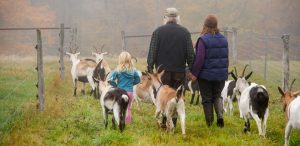University of Maine Cooperative Extension Hancock County – 2021 Annual Report
ANNUAL REPORT
Our Annual Report features highlights of educational programming at the University of Maine Cooperative Extension in Hancock County
June 30, 2021 – July 1, 2022
Table of Contents
- Office of the Dean
- Extension Association and Staff
- County Highlights – Maine Food Systems and Food Security
- County Highlights – 4-H Positive Youth Development
- State Wide Highlights
Putting university research to work in homes, businesses, farms, and communities for over 100 years.
Office of the Dean
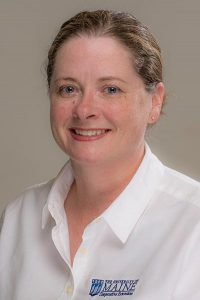
Welcome to the University of Maine Cooperative Extension! We are located across the state in 16 county offices, research farms, 4-H camps and learning centers, and online. We are the largest outreach component of the University of Maine and reach more Maine people than any other entity within the seven campus University of Maine System. Our work is focused on helping Maine communities thrive and we do so by connecting people to research-based information, education and services. UMaine Cooperative Extension conducts the state’s most successful out-of-school youth education program through 4-H, empowering young people to reach their full potential. Our youth programming also includes our 4-H camps and learning centers which provide opportunities for youth to engage in outdoor experiential learning. Extension also helps support, sustain, and grow the food-based economy across the entire state of Maine. In addition, we provide valuable statewide programming in nutrition education, healthy families and communities and within the aquaculture industry. We also partner with other organizations and programs to provide additional educational opportunities to a diversity of audiences across this state.
Extension faculty and staff across the state have also contributed to significant digital outreach this past year. Our Extension website (extension.umaine.edu), which is a combination of 57 interconnected websites, received 3.1 million views in 2021. We have over 700 research-based publications that are available as free downloads at extension.umaine.edu/publications. And in this past year, we had more than 5,000 customers register for workshops, events, webinars and more through our online registration system.
UMaine Cooperative Extension is determined to make a positive difference in our areas of excellence and beyond for the citizens of Maine. Explore our website, visit a county office, and contact our enthusiastic workforce.
— Hannah Carter, Dean
HANCOCK County Extension Association
President – Greg Veilleux – Bar Harbor
V. President – Dotty Caldwell – Penobscot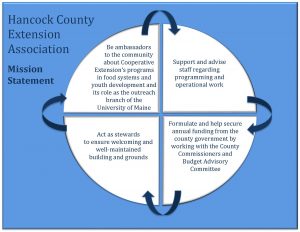
Treasurer – Mary Jude – Southwest Harbor
Secretary – Kristin Beauchamp – Dedham
Members:
Rachel Emus – Blue Hill
Jane Freeman – Ellsworth
Thania Hernandez – Ellsworth
Jeff Milliken – E. Blue Hill
Betty Robshaw – Bucksport
Mary Soper – Orland
Hancock County Staff
Marjorie Peronto – Extension Educator marjorie.peronto@maine.edu
Suzanne Baez – Administrative Support Supervisor sue.baez@maine.edu
Carla Scocchi – 4-H Professional carla.scocchi@maine.edu
Leah McCluskey – Community Education Assistant leah.mccluskey@maine.edu
(New 2022 – supports 4-H Youth Development/Eat Well Volunteers)
Andrea Mahoney – Administrative Specialist andrea.mahoney@maine.edu
(New 2022)
University of Maine Cooperative Extension’s 2021 Digital Presence
Website
University of Maine Cooperative Extension’s website at extension.umaine.edu – a combination of 57 interconnected websites consisting of nearly 12,000 pages – received 3.1 million page views from visitors in the 12 months between January 1, 2021 and December 31, 2021. Visitors searched for and found information on a wide variety of topics, including planting in Maine, small business management, harvest and storage of tree fruits, tussock moth caterpillar identification, and tractor safety. Image galleries helped users identify pests, plant diseases, and weeds. A wide variety of interactive web forms allowed users to request assistance, presentations, newsletters, and updates; report volunteer hours; make donations; and respond to surveys. Nearly 65,000 web visits were referred from social media, more than nine times the previous year.
Social Media
More than 45,000 followers followed or were subscribed to UMaine Extension’s 62 county and program-specific social media accounts on Facebook, Twitter, YouTube, Pinterest, Instagram, and TikTok. Nearly 600 educational videos were available to visitors on our 14 YouTube playlists; many were also embedded in our web pages. Extension’s YouTube videos were the most watched on the University of Maine Channel, which received 1.4 million views and 70,000+ hours of watch time. Top videos included Lobster Cooking and Eating, How to Prune a Blueberry Bush, How Do I Prune Raspberries, Tick Removal, How to Prune a Lilac Bush, and How to Seal Windows for Winter and Summer.
Publications
More than 700 research-based publications on a broad range of topics were available for free download at extension.umaine.edu/publications. Our most popular fact sheets received tens of thousands of page views each. New publications in 2021 included Tips for Growing Houseplants in Maine, Using Checklists to Increase Productivity on the Farm, Best Practices for Plant Sale Donors and Buyers in Maine, Too Much Water or Not Enough Light? Irregular Growth Commonly Seen on Plants Grown Indoors, and How to Cut Up a Whole Chicken.
Online Registration, Brightspace, and MailChimp
Nearly 5,000 customers registered for workshops, events, webinars, and more through our online registration system.
Nearly 200 participants took online courses via Brightspace. Classes included Master Gardener Volunteer training, a Home Horticulture class, and a 4-H Aquaculture course.
More than 9,500 subscribers received a total of 53,880 e-notifications via MailChimp.
HANCOCK County Highlights—
Maine Food System
Support For Hancock County Gardeners
As the Covid-19 pandemic continued in 2021, UMaine Extension offered a variety of online programs to assist new gardeners in learning home food production skills. Once pandemic restrictions were lifted, we were able to resume in-person, hands-on learning programs such as public field days, workshops and volunteer work sessions.
Examples of learning opportunities offered to Hancock County residents include:
Live Gardening Webinars
Extension horticulture experts offered seventeen webinars to help people develop their gardening skills. 185 Hancock County residents participated in these programs. Topics included:
- Exciting new vegetable varieties
- Seed starting at home
- Optimizing plant growth with indoor lighting
- Extending the gardening season in New England
- Protecting fruit trees from insects and disease
- Preventing wildlife damage to home gardens
- Science of pruning
- Propagating trees and shrubs
- Growing microgreens
- Hydroponics at home
- Ornamental garden design
- Designing for winter interest and wildlife
- Tipping fir trees
- Edible native plants
- Cultivating mushrooms
Garden Mentorship Program
This new program matched experienced Master Gardener Volunteers with first-time gardeners, providing virtual technical assistance and encouragement throughout the growing season.
Workforce Training Program: Sustainable Landscaping and Garden Management
In the fall of 2021, Extension Educator Marjorie Peronto collaborated with the Native Gardens of Blue Hill and Kennebec Valley Community College to offer a twelve-part training designed to prepare students to work as professional landscapers and gardeners using organic and environmentally sensitive practices. 20 students from Hancock and neighboring counties completed the course.
Technical Assistance and Soil Tests for Hancock County Residents
Extension staff fielded 620 inquiries from Hancock County residents regarding pest management, soil test interpretation, home food production, ornamental gardening, composting and pesticide safety. Throughout the pandemic, UMaine Extension’s labs continue to diagnose plant diseases, insects, ticks, and veterinary issues. In addition, 870 soil tests were performed for Hancock County growers.
Hancock County Master Gardener Volunteers
The 2021 Maine Master Gardener Volunteers training was revamped, expanded, and offered statewide via ZOOM, reaching a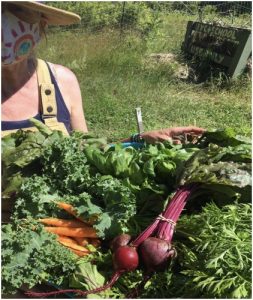 larger and more diverse group of participants because of its accessible online format. Twenty-four Hancock County residents graduated from two-semester course in horticulture and volunteerism. During the summer, the trainees along with returning volunteers conducted community projects such as growing and gleaning food for hunger relief, youth gardening initiatives, and creating public native landscape plantings. In 2021, 101 Hancock County Master Gardeners strengthened our communities through their volunteer efforts. Collectively, Hancock County MGVs contributed 4,581.55 hours of labor valued at $137,217 in 2021. (Calculated using $29.95 per hour, source: Independentsector.org). Master Gardener Volunteer community projects are located in the towns of Bar Harbor, Blue Hill, Brooklin, Eastbrook, Ellsworth, Hancock, Mount Desert, Northeast Harbor, Seal Cove, and Southwest Harbor.
larger and more diverse group of participants because of its accessible online format. Twenty-four Hancock County residents graduated from two-semester course in horticulture and volunteerism. During the summer, the trainees along with returning volunteers conducted community projects such as growing and gleaning food for hunger relief, youth gardening initiatives, and creating public native landscape plantings. In 2021, 101 Hancock County Master Gardeners strengthened our communities through their volunteer efforts. Collectively, Hancock County MGVs contributed 4,581.55 hours of labor valued at $137,217 in 2021. (Calculated using $29.95 per hour, source: Independentsector.org). Master Gardener Volunteer community projects are located in the towns of Bar Harbor, Blue Hill, Brooklin, Eastbrook, Ellsworth, Hancock, Mount Desert, Northeast Harbor, Seal Cove, and Southwest Harbor.
SUPPORT FOR LOCAL BLUEBERRY GROWERS Online Seminars for Wild Blueberry Growers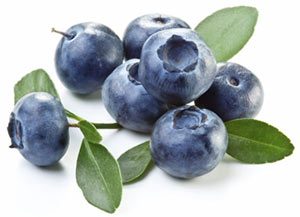
Hancock County lowbush blueberry growers participated in Cooperative Extension’s free webinar series which highlighted University blueberry research updates and offered fifteen online workshops and three in-person field days on production, processing and marketing lowbush blueberries. Pesticide applicator licensing credits were available. All sessions were recorded and are posted on our Maine Wild Blueberries Program website.
Wild Blueberry Research to Improve Crop Production, Harvest and Storage
Twenty-six field research projects were conducted in 2021 to keep Maine blueberry growers informed on best practices for insect, disease and weed management, crop growth and berry quality.
Food Security Initiatives
Hancock County Volunteers Grow and Glean Food for our Neighbors in Need
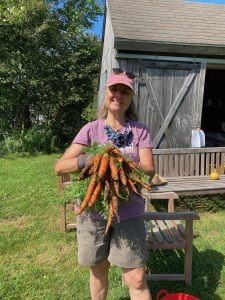
Our Master Gardener Volunteers works tirelessly to grow and glean fresh produce for hunger relief. Nearly six tons of fruits and vegetables were grown, gleaned and distributed to 21 Hancock County food pantries, community meal sites, homeless shelters, school backpack programs and subsidized housing facilities. In 2021, for our eleventh consecutive year, we gleaned and distributed 7,655 pounds of surplus apples from Johnston’s Apple Orchard in Ellsworth thanks to the generosity of Brett and Doris Johnston.
Hancock County Food Security Network
Cooperative Extension and Healthy Acadia bring together representatives from food security organizations throughout Hancock County to work on common issues faced by emergency food suppliers, organize advocacy efforts, share resources and receive professional training. The Hancock County Food Security network orchestrated our eleventh annual Countywide Food Drive during the month of April, 2022. The team raised $47,500 and 4,000 pounds of food for hunger relief in Hancock County, which was divided among seventeen food pantries, community meal sites and school backpack programs. According to Good Shepherd Food Bank and Feeding America, this is equivalent to 145,833 meals for local residents experiencing food insecurity
Selected Partnerships and Collaborations for Horticulture and Local Food Security
- Bucksport Community Concerns
- Charlotte Rhoades Park
- Downeast Family YMCA
- Friends in Action
- Healthy Acadia
- Healthy Peninsula
- Johnston’s Apple Orchards
- Loaves and Fishes Food Pantry
- Maine Community Foundation
- Native Gardens of Blue Hill
- Star 97.7
- Sweet Haven Farm
- United Way of Eastern Maine
- What’s for Suppa Food Pantry
HANCOCK County Highlights—
4-H Positive Youth Development
4-H is the positive youth development program of the University of Maine Cooperative Extension. Hancock County 4-H is focused on educating and empowering youth through hands-on and community-based experiences, with self-directed learning and collaborations. 4-H youth acquire knowledge and skills that will contribute to leadership and the ability to succeed now and in the future. The four “H’s” stand for Head, Heart, Hands, Health, and represent the foundation for positive youth development found in all 4-H programs. The 4-H model for Positive Youth Development is successful because of its focus on positive and sustained relationships between youth and adults, activities that build important life skills, and opportunities for youth to use these skills as participants and leaders in valued community activities. Our 4-H report represents activities July 2021 – July 2022.
New 4-H Staff at Hancock County
Hancock County 4-H experienced a significant staff shortage this year and recently replaced two critical positions.
We are excited to welcome Leah McCluskey, 4-H Community Education Assistant. Leah will be working with both the 4-H Youth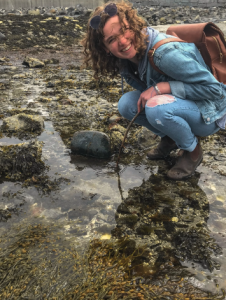 Development and Eat Well Volunteers Programs in Hancock County. Leah graduated from the University of Maine in 2021 with a degree in Marine Science. She also studied Sustainable Agriculture and Fisheries Science during her time there. This is not Leah’s first experience with 4-H. She was one of the first students to take part in the Cooperative Extension 4-H Internship where she worked on the 4-H Aquaponics Project (with Carla!) and began work on an educational demonstration fish tank in the Cooperative Extension 4-H STEM office in Orono.
Development and Eat Well Volunteers Programs in Hancock County. Leah graduated from the University of Maine in 2021 with a degree in Marine Science. She also studied Sustainable Agriculture and Fisheries Science during her time there. This is not Leah’s first experience with 4-H. She was one of the first students to take part in the Cooperative Extension 4-H Internship where she worked on the 4-H Aquaponics Project (with Carla!) and began work on an educational demonstration fish tank in the Cooperative Extension 4-H STEM office in Orono.
Please join us in welcoming Andrea Mahoney to our extension team here in Hancock County! Andrea will be our part-time Administrative Specialist supporting the 4-H Youth Development program as well as receptionist duties.
Andrea graduated from the University of Nevada, Las Vegas in 2010 with a degree in Elementary Education. She has taught many subjects, both in person and online, for over 15 years. Andrea and her family decided they wanted to live a
 gentler pace of life and moved to Maine in 2017. Soon after moving, they got involved in 4-H and found themselves entering fairs, attending jamborees, practicing for public speaking, and much more! They even started keeping chickens!
gentler pace of life and moved to Maine in 2017. Soon after moving, they got involved in 4-H and found themselves entering fairs, attending jamborees, practicing for public speaking, and much more! They even started keeping chickens!
Andrea enjoys painting, crocheting, reading, baking, cooking, and playing games with her family. This summer she took part in the 4-H Summer Learning Series by teaching watercolor workshops. She is such a lovely welcome to the team and she shared that this position is an amazing opportunity to continue working with the organization that helped her own kids grow and learn since moving to Maine.
Selected Program Highlights
Connecting kids and families across Hancock County
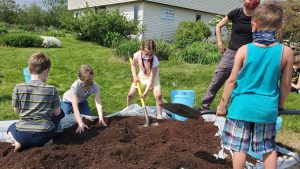
4-H June Jamboree: A mix of take-home and in-person hands on activities across Hancock County to celebrate the return of summer and in-person programming. 4-H Jamboree took place in July 2021 with over 30 participants.
Addressing Summer Learning Loss
4-H Summer Learning Series is a virtual experiential learning for youth ages 5-18 with over 50 online and offline workshops to choose from. Topics range from engineering, art, science, animals & agriculture, food & nutrition, teen leadership, and more. This program is powered by 4-H staff and volunteers. Delivered in Summers from 2020-2022 to over 500 youth; 84% of youth reported feeling connected to others, 94% were able to explore something they really cared about, and 100% felt welcome in the program. This program has quickly become one of our most popular offerings.
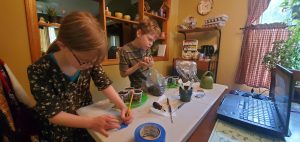
Building 21st Century Skills
4-H Public Speaking Program: UMaine Cooperative Extension 4-H has a robust Public Speaking Program for youth ages 5–18. Youth who participate in public speaking learn to evaluate basic public speaking skills, give and receive constructive feedback, and build confidence to express themselves in various life situations. For those who like the competition of the public speaking tournaments, youth choose a topic that they feel is important to share, practice it with family and/or with their clubs, and enter the Hancock County Public Speaking tournament. Youth who qualify have the opportunity to compete at the state level as well!
Public speaking is an important part of the 4-H experience, even for those who do not pursue formal public speaking opportunities. Many 4-H alumni report how important it was to have public speaking skills when they applied to college, interviewed for jobs, or when interacting with adult peers.
The 2022 tournament was the first hybrid tournament, with a mix of virtual demonstrations and illustrated talks on a wide range of topics including bee keeping, how to make slime, why we smile, and equine dentistry. We also introduced a new category of competition called impromptu or extemporaneous speech. Youth and audience members expressed a desire to continue this opportunity in the future!
Watch the 2021 Awards Ceremony video for a window into the world of 4-H Public Speaking!
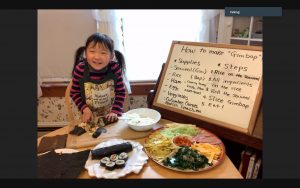
Science, Technology, Engineering, and Math (STEM) Opportunities for Youth
4-H Aquaponics Project: The 4-H Aquaponics Project is an experiential learning program for youth ages 9-18 that includes project-based learning experiences in introductory aquaponic systems and design, fish husbandry, aquaponic gardening, project management, and more. Youth are responsible for designing, building, and maintaining their own aquaponics systems independently at home with guidance from aquaculture experts, youth development professionals, and their fellow youth peers during regular group meetings. Thanks to the generosity of the Maine 4-H Foundation, the program participants receive start-up funding to support their at-home systems. The program is a collaborative effort between Hancock County 4-H, the Center for Cooperative Aquaculture Research, and the Aquaculture Research Institute. Youth participants have gained many experiences and skills that are sought after by the aquaculture industry, one of the fastest growing industries in Maine (Maine Aquaculture Workforce Development Strategy, 2020). Additionally, most households reported it was the focal point of their summer and that the shared goals not only brought them closer as a family but provided much needed social-emotional support and peer connection for youth during a challenging time.
In 2022 and 2023, the 4-H Aquaponics Project is expanding to classrooms across the state. It will provide project-based learning opportunities for middle and high school students and teachers who are interested in getting hands-on with aquaculture, engineering, science, and agriculture!
*This program received the Denise Miller National 4-H Innovator Award in 2021 and was featured in the UMaine Today Winter 2022 Issue
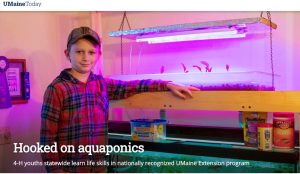
“Hooked on aquaponics” featured story in the UMaine Today magazine.
Selected Partnerships & Collaborations with the 4-H Youth Development Program
- Ellsworth Public Library, Ellsworth
- UMaine Center for Cooperative Aquaculture Research, Franklin
- Lone Spruce Farm, Dedham
- Blue Hill Heritage Trust, Blue Hill
- Art Waves MDI, Bar Harbor
- Maine Maritime Academy, Castine
Parent testimonials
“Thank you for creating safe places for 4-H in Hancock County with your training of volunteers and leaders. I have never seen leaders quite like this.”
“Thank you again, for having a safe place for kids to be brave and attempt things outside their comfort zones.”
“The training [4-H] volunteers receive is top notch, and it does have a ripple effect in a world that can be very challenging to navigate. [My son] is only 1 story, and these are only a few parts, so I can only imagine all of the untold parts that are tucked away in Moms and Dads hearts that have happened in the 4-H Hancock County community. I have seen, heard, and felt being included. And more importantly, our son, who has been told in school and other groups, “You’re too this….”you’re too that….”, it has been refreshing to have him wanted, not just tolerated. These are the connections that matter.”
“They were able to easily feel like they belonged, felt welcomed, and when children feel this way they are open to learning and trying new things”
“She has learned so many life skills from being in 4-H and built so many wonderful lifelong friendships”
“The organization of [4-H] materials and delivery of learning is always top notch”
“The effort, skill, and perseverance that went into putting this [program] all together is not only amazing, but shows so clearly just how dedicated 4-H is to our youth!”
![]()
STATE WIDE HIGHLIGHTS
Maine Food System
Integrated Pest Management for Maine Potatoes and Fruit Trees
The University of Maine Cooperative Extension Diagnostic Research Laboratory provides pest identification and integrated pest management education to commercial and home clients. The $500 million potato industry is the largest agricultural sector in Maine, encompassing more than 500 businesses generating more than $300 million in annual sales, employing over 2,600 people, and providing over $112 million in income to Maine citizens. In 2020 the Extension’s IPM research and identification efforts saved Maine’s potato industry an estimated $10 million in losses avoided, yield increases and reduced pesticide use; for an expenditure of $95,000, the return was 110 to 1. And our IPM program saved Maine’s fruit tree industry over $5.1 million in losses avoided, and over $1.1 million savings in pesticide savings in purchase costs.
Extension Shares PFAS Resources for Farmers
Relevance — Low levels of PFOS, PFOA and other PFAS are present in our environment. Higher levels are sometimes found near airfields that may have used fire-fighting foams, factories that used these chemicals, or land with a history of using certain waste materials or biosolids containing PFOS, PFOA, or other PFAS. Crops may be grown on soil that has these PFAS, but how much of these chemicals are in the crop depends on the type of crop, what part of the crop is edible, soil properties, and levels in the soil. These chemicals may end up in the milk and meat of animals fed crops like hay containing PFAS. These chemicals can also move from the soil into the groundwater and into well water. Consuming contaminated milk, meat, plants, or water are potential ways people can be exposed to these chemicals. The state of Maine has allocated significant funding for dealing with issues related to PFAS and is dedicated to supporting the landowners who are affected by land application of wastewater sludge and septage, AFFF, Department of Defense sites, landfills or other PFAS sources.
Response — UMaine Extension has made a dynamic set of resources about on-farm PFAS contamination available online to the public in one location: extension.umaine.edu/agriculture/guide-to-investigating-pfas-risk-on-your-farm/. “Guide to Investigating PFAS Risk on Your Farm” is a comprehensive collection of resources about contamination from Per- and Polyfluoroalkyl Substances in Maine. Topics include Maine’s response to contamination at agricultural sites, steps to determining risks and mitigation options for farms, and information on the sources of PFAS contamination. The new website will be updated as the research and resulting information evolves. The resources are from multiple Maine state agencies, including the Departments of Agriculture, Conservation and Forestry, Health and Human Services, Environmental Protection, and Maine CDC. Supporting organizations contributing information include UMaine Extension, Maine Farmland Trust and Maine Organic Farmers and Gardeners Association.
Building Service Provider Capacity in Climate Adaptation Practices
Relevance — Current and projected changes in weather present new opportunities and risks for Maine agriculture, such as longer growing seasons but increased risks of spring frosts, summer droughts, and more frequent and intense rainfall. In many cases, the climate adaptation practices that farmers and agricultural service providers have identified as helpful (e.g. irrigation and weather-based decision support tools) require new knowledge and skills, not just for the farmer but also for their service providers, such as Extension, NRCS, conservation districts, state agencies, private crop services, and non-profit organizations.
Response — During the winter of 2021, we conducted a Northeast SARE funded, comprehensive needs assessment of agricultural service providers who work directly with farmers to identify their knowledge gaps and training needs as related to helping farmers adapt to climate change. Across the Northeast, 381 completed an online survey, including 61 who said they work in Maine. Eleven Maine providers also participated in a related focus group.
Results — Eighty percent of the respondents who work in Maine said they are interested in helping farmers address climate change but only about half said they currently have the needed knowledge, skills, and confidence. Drought, extreme precipitation events, and changes in water availability were rated as severe or major climate change risks by 70% of respondents. Respondents reported being least confident in providing recommendations to farmers about investing in irrigation and water source development; ditching, water diversion, drainage tiles, and other ways to address too much water; and using weather-based decision tools. Among these Maine respondents, 83% said they would be likely or extremely likely to participate in professional development opportunities to improve their ability to help farmers adapt to climate change. Results from these studies were used to develop a 3-year SARE professional development program to build provider capacity in Maine in climate adaptation practices.
So, You Want to Farm in Maine?
Relevance — Current farmers thinking about changing farm enterprises and new farmers interested in starting a farm may lack the skill, knowledge and confidence to investigate their options to start, adapt, and maintain a profitable land-based business. Major issues farmers and potential farmers (whether full-time or part-time) need to overcome include access to capital, understanding of rules and regulations affecting agriculture operations, and marketing options.
Response — UMaine Extension created the So, You Want to Farm in Maine short-course in 2015. Traditionally offered in person, this is the third year it is available online only. It is designed to introduce farm business management topics to those who are starting farms in Maine. The 2021 session was a bit different as participants include 44 aspiring farmers as well as 11 UMaine undergraduates, providing the opportunity for richer discussions and connections between those interested in starting Maine farms imminently, as well as students with a variety of backgrounds and experience. The undergraduates are teamed with aspiring farmers to create draft business plans over the course of five weeks. Farmers have the opportunity to receive USDA Farm Service Agency borrower training credit, and undergraduates receive one credit.
Since 2015, 292 people have participated through face-to-face, video-linked, webinar, live-streamed, Zoom, and archived sessions to learn about agriculture enterprise selection, business planning, record keeping, market research, regulations, and resource identification.
Results — Knowledge change was assessed by a post program evaluation. Participants responding to a program evaluation reported having moderate to considerable knowledge and understanding of the following topics following the program: Goal setting and farm business management plan development; enterprise budget development and evaluating profitability; land and asset assessment; marketing and marketing research; record-keeping (production and financial); estate planning and insurance; permits, licenses, and regulations; Credible sources of production information and pricing; taxes (local, state and federal); financial management. Successful completion of this course qualifies participants for FSA Borrower Training Credit; In 2021, participants who chose to get the FSA certification included enterprise budgets totaling over $139,000 in projected income.
University of Maine Veterinary Diagnostic Laboratory (VDL)
Relevance — During 2021, the University of Maine Veterinary Diagnostic Laboratory (VDL) stayed open, providing service to farmers and veterinarians as requested.
Response — We allowed egg producers in Maine to keep marketing their product by providing FDA-required screening for Salmonella enteritidis (SE) on midsize to large egg farms. We helped dairies find out whether their cows were affected by mastitis, and if so, what “bugs” were responsible. We helped horse, sheep, goat and cattle owners check to see if their animals need worming, and if so, with what kind of product; we also helped them find out if their chosen product actually worked in their animals. We helped the state animal welfare vets discover whether animals had died due to neglect or cruelty by providing fact-based forensic information via conducting necropsies.
Results — Four undergraduate students were employed by the VDL during this time, and were trained and mentored in a socially-distanced environment. We have helped our staff and clients comply with restrictions imposed by the pandemic, and used creative strategies to keep our productivity within normal limits, at the same time as offering new services. While the COVID-19 pandemic changed the manner in which we operated, we remained open and active continuously during 2021 and 105 necropsies of many species of animal, from woodchuck to horses, were conducted in the new UM VDL necropsy room. We were able to host a virtual REU program during summer 2021, and planned an in-person summer program.
Our diagnostic lab assists UMaine academic researchers by assisting with sample preparation for histologic studies, by collaborating on studies where pathology assistance is needed (including a patent for a biomedical device), and by providing microbiological testing in a new study of multi-drug resistant Staphylococcus aureus (MRSA). We are collaborating with other animal science faculty and with the Maine Department of Inland Fisheries and Wildlife (IFW) on studies of moose health, and are investigating methods for reducing the risk of meningeal worm (Parelaphostrongylus tenuis) transmission from white tailed deer to domestic ruminants.
Our lab hires a small number of student workers of diverse backgrounds, who benefit the lab by providing energetic, curious and detail-oriented efforts. These students help us adapt our methods to develop better teaching and outreach materials for farmers, at the same time as they develop skills and knowledge that will help them in their veterinary careers. Our lab combines service, research and education to improve agriculture, the food system, and the quality of life in Maine.
Diagnostic and Research Laboratory Brings Many Scientists and Specialties Together Under One Roof
The University of Maine Cooperative Extension Diagnostic and Research Laboratory occupies a 28,000-square-foot commercial laboratory building located a few miles from campus, and houses our Veterinary Diagnostic Lab, Aquatic Animal Health Lab, Arthropod Lab, and Plant Disease Diagnostic Laboratory. This facility is the most bio-secure location within the UMaine System. Opened in 2018, the lab brings together scientists researching animals, agriculture, insects, and plants under one roof. The unique combination of researchers provides many teaching opportunities for students, as well as premier research and outreach facilities. By allowing for research contributions to agriculture, public health, communities, and wildlife, the lab benefits Maine in a variety of ways, including protecting the natural resource- and food-based economies, adding to food safety and human health, and providing unique diagnostic and testing services to farmers, homeowners and the public.
Process Validation to Seafood Processors
Relevance — In order to meet FDA seafood regulations, food processors must thermally process their product correctly to ensure regulatory compliance and safe food production; this includes all cooked ready-to-eat seafood products. Most processors do not have employees that can provide these validation reviews and there are a limited number of process authorities that can provide these services.
Response — In 2021, 106 clients (64 from Maine) submitted 410 food products (264 from Maine) for testing that included a total of 873 tests. Extension created individualized reports on all products.
Results — The testing lab had a 37% increase in products over 2020. One co-packer in Maine submitted 62 products and 178 tests to support Maine and out-of-state clients to produce their food products. This Maine co-packer said Extension was able to assist them to comply with FDA requirements and that Extension’s support helped them secure $500,000 worth of new client business in 2020. The co-packer noted Extension’s knowledge of FDA regulations and ingredients demonstration of a true partnership to help develop and grow new clients from Maine and all over the country.
Recipe to Market Program: Growing Successful Food Entrepreneurs in Maine
Relevance — There has been a growing interest in value-added food production in Maine. From farmers looking to add value to their raw products, to Maine families interested in turning their favorite recipes into viable food businesses. In response to this growing demand, UMaine Extension developed the Recipe to Market program in 2007 and has been offering it to statewide audiences annually ever since. The goal of the program is to help potential and existing food entrepreneurs acquire food science and business knowledge and skills to successfully bring a value-added food product to market.
Response — Since 2007, Extension has conducted 36 programs in 10 counties reaching 480 participants across the state. The program is offered in either single or multi-day formats, in person or virtually, and is designed to help participants understand licensing/regulations, processing/packaging, the specialty food industry and acquire business management knowledge and skills. The RTM team provided similar content for the Wild Blueberry Conference winter/spring 2021 and was able to reach additional participants statewide. The RTM Team also supported food businesses during the pandemic by offering a panel session at the Maine Ag Trades Show via Zoom titled “Pivoting During the Pandemic – How Food and Beverage Businesses Creatively Thrived in 2020.” The team invited 4 small businesses to discuss the impacts of the pandemic on their businesses and how they creatively pivoted to stay in business and to thrive during the pandemic. These businesses ranged from a brewery in Ellsworth, to a value-added products/blueberry farm in Ornesville Township to a cheesemaking business in Whitefield, that also created a new distribution business to support their fellow cheesemakers.
Results — As a result of these programs, more than 90% of participants said they improved their knowledge and skills and plan to adopt business and food processing/safety practices they learned during the program. Long-term survey results indicate that participants used the new knowledge from RTM to make more effective business decisions, develop new food products, and write and revise business and marketing plans. The survey results also indicate that 27% of the RTM multi-session participants subsequently started food businesses. We estimate that 60 new value-added food businesses, generating $2.1 million in direct sales and employing 102 workers were started in Maine by the 221 people attending our Recipe to Market multi-session programs since 2007.
Home Horticulture
Relevance — Every day, Maine gardeners are deciding on whether and how to manage pests, what fertilizers to use and how much, what plants to grow, methods to cultivate the soil, and how to utilize water resources to maintain landscapes. Nearly every residential site has a landscape that requires maintenance and decisions made in these sites can have a significant impact on our natural resources. Home gardener success also results in improved food security and has an economic role in our green industry.
Response — In 2021, home horticulture programming directly reached 12,256 adults and 896 youth through over 120 hours of educational programs, both in-person and virtual. This included over 5,223 questions, received via email, phone calls and walk-ins that were answered for home gardeners. An additional 14,579 home gardeners were reached indirectly through garden-related videos, newsletters, newspaper columns, and publications from Extension.
Results — As a result of Extension programs, participants reported developing new or expanding existing gardens; increased their consumption of home-grown food; adopted sustainable gardening practices involving soil quality, improving efficiency, and adopting IPM strategies; and using Extension to identify pest problems and to determine research-based management strategies.
Maine Food and Agriculture Center Supports State’s Growing Industries
Relevance — The MFAC is a partnership of Extension and the Maine Agricultural and Forestry Experiment Station.
Response — The center utilizes the 16-county reach of Extension, and many of Extension’s recommendations to the state’s agricultural community come directly from research conducted at Experiment Station farms. This research-extension partnership has been working for over 100 years and is as vital today as it was early in the 20th century.
Results — With $5 billion in overall economic impact, agriculture, commercial fishing, and food processing include Maine’s largest, fastest growing, and most promising industries. MFAC is growing to encompass all sectors of the burgeoning food economy, establish first-contact access to the programs and expertise available at all seven of Maine’s public universities, and create opportunities for cross-campus and cross-discipline coordination and program development based on emerging needs in Maine’s food economy.
4-H Positive Youth Development
4-H Ambassadors Spark Student Interest in STEM Careers
Relevance — Developing Maine youth’s STEM literacy is vital to ensuring that our state continues to thrive economically and socially. Given the remote and diverse communities where Maine youth live, informal education can help minimize inequities in rural youth STEM education and career pipelines. Future career opportunities in Maine will depend heavily on STEM skills, whether in the growing fields of healthcare and engineering, or in positions requiring technical skills, such as construction, and maintenance of transportation and energy systems.
Response — Since 2014, Extension’s 4-H STEM Ambassadors program has enrolled and trained more than 500 UMaine System students who have facilitated in-person, hands-on learning experiences fostering youth STEM enjoyment, literacy, and identity, reaching more than 6,000 Maine youth aged 8-14 in classrooms, libraries, and after-school clubs across the state. In Fall of 2020, to meet university and community COVID guidelines, Extension redesigned the program to be virtual, including a training, mentoring, and experiential STEM programming.
Results — The shift to a virtual program allowed for multi-campus student teams and increased access for more distal community partners regardless of local program model (remote, in-person, hybrid). In 2020, the 4-H Stem Ambassadors program reached more than 200 students, grades 3-8, across 11 sites with the help of 34 volunteer Ambassadors and 4-H staff facilitators. And in 2021 the program reached more than 300 students, grade 3-8, across 18 sites with the help of 39 volunteer Ambassadors and staff. Through this program, youth ages 8-14 come to view these Ambassadors as mentors and leaders in their community while also developing skills in STEM through hands-on activities, and becoming connected to research, resources, and scientists at Maine’s public universities.
Summer of Science
Relevance — Research shows that low-income students have less than average access to science education, and a STEM achievement gap is perpetuated during summer months for low-income students, who lose more grade equivalency due to lack of out-of-school and summer learning opportunities. An increase in STEM education can lead to better employment opportunities and increase the likelihood of youth furthering their education. Summer of Science seeks to improve student proficiency in STEM, introduce them to STEM careers, and support low-income students in an effort to decrease summer learning loss. SOS is unique in utilizing Teen Teachers – often a first paid position for high school students. Partnering with other youth organizations, interns and teen teachers lead activities for youth in grades 3-6. Teens and interns gain skills in career development, time management, leadership, public speaking, and group work.
Response — UMaine Extension created the 4-H Summer of Science program to increase science proficiencies in local communities and prevent summer learning loss by providing informal hands-on experiential learning opportunities in STEM to Maine youth and engaging Maine youth in low-income areas in meaningful experiential STEM activities. Maine 4-H staff and Summer of Science college interns developed and modified four science activities that in 2021 were delivered in 7 Southern Maine communities at 12 sites including summer lunch programs, Public Housing, elementary schools, community youth clubs, and summer camps. Over 4 weeks, with the support of Maine 4-H staff and adult volunteers, 31 teen teachers and four college interns engaged 450 youth. One activity focused on designing and testing the design of face masks – connecting current world events related to the COVID-19 pandemic to the engineering design process.
Results — 4-H staff use summer of science experiential learning activities to assist with summer learning loss and work towards engagement and interest in science. The program focuses on programming where youth already are, and uses positive 4-H youth development programs to reduce barriers to involvement in STEM. By engaging in Summer of Science activities, these youth are well poised to return to their academic school year with reduced summer learning loss and an increased interest in science. In addition, research shows that youth involved in 4-H are more likely to pursue future courses or a career in science, engineering or computer technology, which can lead to improved employment opportunities. For Maine elementary school youth, Summer of Science supports narrowing their STEM achievement gap during summer months, and for the teens trained to deliver programming, it also fosters their career development, leadership and sense of responsibility.
Reducing Obesity in Youth
Relevance — Nationally, in 2019-2020, 16.2% of youth ages 10 to 17 were obese; in Maine, 13.7% of youth ages 10 to 17 were obese. National data for childhood overweight and obesity may not accurately represent more recent realities during the COVID-19 pandemic. Stay at home orders, lack of structured school schedules, increased screen time, disruptions in household income, lack of access to nutrient-rich lower calorie foods, and fewer opportunities to be physically active increased risk factors for childhood overweight and obesity. And Maine ranks first in New England in terms of food insecurity with 20% of our children food insecure.
Response — To help lower childhood obesity rates, UMaine Extension EFNEP provides direct education to Maine’s low-income children to improve their knowledge, behaviors, and attitudes related to improving diet quality, increasing daily physical activity, and using food resources management practices to learn how to plan and shop for healthy meals and snacks. Program outcomes are measured for all youth ages 5-18 using validated pre/post program surveys.
Results — In 2021, 853 youth participated in Maine EFNEP. Youth participated in an average of 6.5 classes over a time frame of four months. Eighty-seven percent of youth participants completed a pre and post survey. As a result of participating in EFNEP:
- 83% of youth improved their abilities to choose foods according to current Dietary Guidelines or improved nutrition knowledge.
- 47% of youth improved their daily physical activity practices.
- 47% of youth used safe food handling practices more often.
- 50% of youth improved their ability to prepare simple, nutritious, affordable food.
Connecting Maine Youth with Coastal Ecosystems through eDNA
Relevance — From lakes to rivers, estuaries and in-shore waters, Maine’s coastal ecosystems are impacted by numerous stressors, including warming, fisheries declines, invading species, harmful algal blooms, and severe disturbance events. As we explore ways to support these ecosystems in the short and long term, Maine youth will play a crucial role over time.
Response — UMaine Extension is a partner in the University of Maine’s 5-year NSF EPSCoR funded grant, Maine-eDNA. Maine-eDNA will advance both ecological understanding of coastal macrosystems and the inference capacities of environmental DNA (eDNA) science needed to translate knowledge into action. UMaine Extension’s 4-H program connects University research to Maine youth through 4-H STEM Toolkits that are being used by educators to teach youth about cutting-edge UMaine research. During 2020 and 2021, we developed experiential learning activities designed to teach youth about sustainable fisheries, and how eDNA contributes to fisheries knowledge. We have created and made available for youth in grades 3-6, sets of eight experiential learning activities connected to the eDNA research.
Results — In 2021, 327 students and 54 teachers engaged with eDNA 4-H science toolkits. These “kits” are provided at no charge, and include both in-person and virtual options. We found that virtual facilitation of activities, with materials sent directly to youth for their use, reduces barriers to participation both during the pandemic, and also may reduce barriers such as travel time, transportation. .
4-H Passport Around the World
Relevance — For more than 100 years, 4‑H has welcomed young people of all beliefs and backgrounds, giving kids a voice to express who they are and how they make their lives and communities better. Through life-changing 4‑H programs, Maine youth have taken on critical societal issues, such as addressing community health inequities, engaging in civil discourse and advocating for equity and inclusion for all. In 2020-2021, as a result of the pandemic many youth were home, isolated, and not connecting with others. In Maine there are many cases of families wanting to join 4-H but there is no club in their geographic area for them to join. In addition, during the pandemic many of these clubs were not meeting, resulting in even more youth without access to 4-H & peer-to-peer interactions. Maine is also a state where much of its diversity is concentrated around large cities, leaving many youth in rural areas without opportunities for exposure to diversity of cultures, people, and ideas.
Response — Extension partnered with Greenheart Exchange to create a virtual club to give Maine youth an opportunity for connection with youth from all over the world. 4-H Passport Around the World was a virtual short-term club that met weekly for three different, six-week sessions for a total of 18 sessions in 2021. Greenheart Exchange teens gave short presentations about their country, followed by a hands-on activity connecting with their culture, and time for questions and discussion. Teens presented from Ghana, Ukraine, Thailand, Bangladesh, Kosovo, and beyond, exposing youth to cultures and countries they may not have known about before.
Results — As a result of this program, youth learned about other countries and cultures. Parents said that by participating their child gained a greater understanding and appreciation for the similarities and differences of cultures other than their own. Not only did this virtual club provide connection, but it did so in a way that opened the minds and hearts of teens in Maine to diverse cultures and people.
Tractor Safety Classes Help Keep Youth Safe in a Risky Business
Relevance — Every 3 days, 100 children are injured and one dies in an ag-related incident in the U.S. For working youth, tractors were the leading source of fatalities. In addition to the devastation brought on by the loss of a life, farm accidents result in negative emotional, community, and economic impacts. Access to tractor and farm safety knowledge and interactive training increases adoption of safety practices, results in fewer farm accidents, and enhances employment opportunities.
Response — Extension staff developed a hybrid model tractor safety course for 2021, offering virtual lectures with hands-on experience as a result of the pandemic. Additionally, the public received farm safety information through newsletters, video production, social media, and short courses offered at 9 farms, non-profit organizations and ag related businesses. To support this programming, we collaborated with the Maine Farm Bureau, The Northeast Center, tractor dealerships, and local farms.
Results — 118 youth and farmers took part in UMaine Extension’s 2021 Farm and Tractor Safety Trainings. 28 individuals completed the 20-hour, National Safe Tractor and Machinery Operation Program curriculum. Each class focused on practical skills learning including written and driving tests. 90 people took the abridged Tractor Safety Short Course. One tractor safety youth alumni reported; “I feel as though I have a greater general awareness while I’m on the tractor – always wearing my seatbelt, checking my surroundings, getting to know the size/power of the tractor, etc.,”. A farm owner participant of the program reported “(installing) some better shields for the PTO. And we fixed a tractor that was not running well and got the breaks tuned up, etc.
4-H Summer Camp and Learning Centers
Connecting Youth to the Outdoors and Building Community
Relevance — Research has shown that positive social and emotional learning experiences can significantly impact youth development and connecting youth to a positive adult role model decreases the risk for making unhealthy choices or engaging in risky behaviors. With youth spending more time connected to social media and other digital platforms resulting in isolation and sedentary indoor time, many youth suffer from obesity and/or ADHD, and some lack opportunities to develop positive interpersonal communication skills.
Response — UMaine Extension 4-H Camp and Learning Centers provide programs for youth ages 4-17, many from underserved populations, to have transformational experiences designed to develop a sense of place and belonging, and confidence in the outdoors. Our programs include both day and residential summer camps, onsite open-air classrooms for schools, and school-based programs, as well as adult programming and workshops. We have a well-developed virtual component to our programs that gives them added depth and maximizes accessibility. Our Learning Centers typically attract over 2,500 youth each summer, and provide school programming for over 6,000 students from more than 60 Maine school groups.
Results — In 2021, our 4-H Camp and Learning Centers came through the pandemic safely:
- Delivering full spring, summer, and fall programming at the UMaine 4-H Learning Centers at Blueberry Cove, Bryant Pond, and Tanglewood, including programs in water ecology, forest ecology, wilderness survival, and conservation education.
- Collaborating with New Hampshire and Vermont to develop an AgriSTEM curriculum and deliver it virtually and in person among the 3 states to 594 students, including summer campers at 4-H centers.
- Continuing to support Telstar Freshman Academy at Bryant Pond, offering daily and yearlong, experiential learning designed to engage students in an outdoor setting.
- Continuing to deliver the NorthStar Youth Mentoring program that connects young people with caring adults through community engagement, cultural exchange, and adventure challenge and leadership. The program is grounded in in-person contact, and also uses virtual contact for family and other activities.
- Continuing, through Tech Wizards, to provide STEM education and service-learning to help youth learn life and workforce skills, improve academic performance, and aspire to pursue post-secondary education, leading to fulfilling careers and participation in their communities.
- At Greenland Point in Washington County, one of Maine’s most impoverished counties, offering hands-on, ecology-focused education, and through scholarships making sure that price is not an obstacle to anyone who wants to come to camp.
- Open Air Classroom and summer camps at Tanglewood and Blueberry Cove offering programs tailored to community needs, including youth development programs for schools seeking to address the learning loss students had faced during the pandemic.
Sustainable Community and Economic Development
Improving Food Security and Diet of Parents and Caregivers
Relevance — Public and private gardens are important tools for enhancing both physical and mental health. They also play a key role in sustaining the health and vitality of our natural communities. Since the beginning of the pandemic, gardening has been on the rise in Maine with our offices experiencing a tremendous influx of gardening questions. As it becomes more and more challenging to sort through information online, Maine gardeners need access to reliable research-based information, now more than ever. Extension trains and supports Master Gardener Volunteers, who help extend University knowledge to their neighbors through the teaching of sustainable gardening practices.
Response — The Master Gardener Volunteers (MGV) program provides participants with a minimum of 40 hours of in-depth training in the art and science of horticulture. Trainees receive current, research-based information from our educators and industry experts and are connected with service projects that match their interests, skill set, and availability. MGV coordinators facilitate relationships between MGV and community partners; assisting with needs assessment, program planning, risk management, and problem solving. In 2021, Master Gardener Volunteers played a vital role in connecting communities with educational resources through one-on-one mentoring, social media and programming.
Results — The MGV program provides opportunities for gardeners with all levels of experience to connect with meaningful service projects in their community. Of the 990 active MGV, 145 were trained in 2021. In total, they donated 28,830 hours to a variety of educational and food security projects throughout the state including community gardens, school gardens, demonstration gardens, and youth programs.
As a result of participating in this program, MGVs reported that they:
- utilized UMaine Extension to identify pest problems and determine research-based management strategies,
- increased consumption of home-grown food,
- adopted techniques to improve soil quality,
- developed new or expanded gardens,
- implemented practices that improve efficiency, reduce inputs and negative impacts,
- inspired to pursue further horticulture training,
- increased community partnerships, and
- engaged positively with their community.
Master Gardener Volunteers
Relevance — Successful school and community gardens are an important tool for enhancing public health and providing meaningful community engagement opportunities by increasing access to locally grown food, providing a safe space to connect with neighbors, and offering learning opportunities outside the classroom. Extension supports volunteer leaders and provides educational resources, which are key contributors to the success of these projects.
In 2020, due to the pandemic, gardening and gardening questions increased as much as 70% from last year in some counties. Now more than ever Maine residents need access to reliable research-based information to become successful gardeners.
Response — In 2020, Master Gardener Volunteers (MGV) played a vital role in connecting communities with educational resources through one-on-one mentoring, social media, and virtual programming. The MGV program provides participants with a minimum of 40 hours of in-depth training in horticulture. Trainees receive current, research-based information from our educators and industry experts and are connected with service projects that match their interests, skill set, and availability. MGV coordinators facilitate relationships between MGV and community partners, assisting with needs assessment, program planning, risk management, and problem solving.
Results — The MGV program provides opportunities for gardeners with all levels of experience to connect with meaningful service projects in their communities. Of the 932 active MGVs, 113 were trained in 2020. In total, they donated 7,600 hours to a variety of food security projects and virtual volunteer opportunities. MGVs reported that they:
- increased consumption of home-grown food
- adopted techniques to improve soil quality
- developed new or expanded gardens
- implemented practices that improve efficiency and reduce inputs and negative impacts
- engaged positively with their communities.
Many volunteers enter the MGV program with the goal of improving their gardening skills for their own personal benefit and leave surprised by how deeply involved and passionate they become about community projects.
Maine Harvest for Hunger: Support for Food-Insecure Citizens
Relevance — Maine has the highest rate of food insecurity in New England and ranks 19th in the nation. The USDA estimates that 11.4 percent of Maine households are food insecure. Furthermore, nearly 1 in 5 children are food insecure and 23 percent of Maine seniors are experiencing marginal, low, or very low food security. It is especially challenging for food insecure people to afford high quality, fresh, nutritious food, and donations of fresh produce to Maine’s emergency food system have declined significantly in recent years. With hunger affecting people of all walks of life in all communities, it is essential that every measure be taken to feed our neighbors in times of need.
Response — Since 2000, UMaine Extension’s Maine Harvest for Hunger (MHH) program has mobilized gardeners, farmers, businesses, schools, and civic groups to grow, glean and donate fresh produce to food pantries, shelters, community meals sites throughout Maine. Our work involves: maintaining databases of sites accepting produce donations, organizing volunteer opportunities, developing partnerships with farms and organizations, training volunteers, and building awareness of the extent, causes, and impacts of food insecurity.
Results — In 2021, 424 MHH volunteers grew, gleaned and distributed 168,304 lbs. of fresh produce, valued at $284,434, to 228 food security agencies located throughout the state. Notably this year, Spiller Farm celebrated 21 years of partnering with MHH; a relationship that has yielded 246,688 lbs. over the years. In addition to welcoming us to glean surplus crops, they intentionally planted extra knowing trained volunteers could be trusted to safely and efficiently get it to where it’s needed. And Old Town Elementary School’s free farm stand offered 4,138 lbs. gathered onsite and gleaned from area farms. Open to the public in an easily accessible site, this low-barrier program reached hundreds of individuals in a limited resource community. From backyards, to farms, to school gardens, Maine Harvest for Hunger is enhancing access to healthy food and offering volunteers a truly meaningful way to engage with their community. Since 2000, MHH participants have distributed more than 3.2 million lbs. of food to citizens grappling with hunger.
Expanded Food and Nutrition Education Program (EFNEP) and Food Security
Relevance — In 2019, the poverty rate in Maine was 11.8%, representing 153,131 people living in poverty. In 2019, 1 in 9 individuals and 1 in 7 children lived in food insecure households. Yet, Feeding America projected that 1 in 8 people and 1 in 6 children could experience food insecurity in 2021 due to the pandemic. The pandemic exacerbated greater health disparities among low-income populations. The combination of high rates of food insecurity and obesity of Maine adults will continue to put a strain on current health promotion programs and continue to raise health care costs for the nation.
Response — To improve the food security and the diet of Maine’s low-income parents and caregivers, UMaine Extension implements direct education (remotely in 2021) through the Expanded Food and Nutrition Education Program EFNEP to improve behaviors related to improving diet quality, increasing daily physical activity, and using food resources management practices to learn how to plan and shop for healthy meals and snacks. Program outcomes are measured for all adults using validated pre/post program surveys.
Results — In 2021, 453 adults participated in remote delivery of Maine’s EFNEP, and of those 304 graduated (67%). Post-program surveys indicated that as a result of participating in EFNEP:
- 33% eat fruit more often each day,
- 31% eat vegetables more often each day,
- 26% drink soda less often,
- 54% showed improvement in one or more physical activity indicators,
- 35% plan meals before shopping more often,
- 27% make a list before shopping more often,
- 36% use a weekly or monthly food spending plan.
- 61% showed improvement in one or more food safety practices
Mainely Dish Social Media Outreach
Relevance — COVID-19 impacted people’s lives in a variety of ways, including the increased need for easily accessible information about how to cook affordable and nutritious foods at home. EFNEP’s social media platform became key to reaching Maine’s low-income adults, youth, and young adults to share research-based food and nutrition information to meet their needs. By learning more about diet quality, physical activity, food safety, and food resource management the consumers will be able to learn and apply this knowledge to their everyday life.
Response — To increase EFNEP’s virtual presence and reach more Maine people, EFNEP’s social media platforms were expanded beyond Facebook to include Instagram and TikTok. In response to COVID-19, the development of short recipe videos, “Mainely Dish” began. Mainely Dish videos are used by multiple program areas, including 4-H, Food Preservation, Home Horticulture and EFNEP. By using inviting graphics, timely educational content, and Mainely Dish videos, social media reach has grown and EFNEP, social media and online presence has become prominent in Extension and through the state.
Results — In 2021, UMaine Extension’s EFNEP Facebook page increased likes by 90 people for a total of 547-page likes. UMaine Extension’s EFNEP’s Instagram increased followers by 96 people for a total of 191 followers. We created 51 new videos for Extension’s EFNEP Mainely Dish recipe videos for a total of 87 videos created since March 2020. UMaine Extension’s

